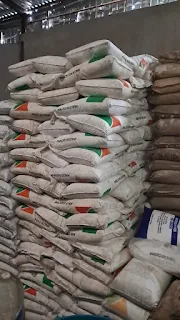· · · Seizes Dangerous Additives, Fertilisers In Ketu Warehouse, Arrests Three
chemical crime syndicate in a Lagos raid, revealing a vast illegal operation involving dangerous chemicals, expired food additives, and unauthorised fertilisers concealed in three warehouses in the Alapere area of Ketu, Lagos.
Acting on reliable intelligence, the National Agency for
Food and Drug Administration and Control (NAFDAC) officers carried out the
coordinated raid on Tuesday, arresting three individuals.
In addition, the agency sealed the premises in what officials described as a
major breach of public health and national security regulations.
Unmasking A Threat To
Consumer Safety
Dr Martins Iluyomade, Director of Investigation and
Enforcement, stated during a press briefing that the suspects had been
masquerading as legitimate business operators while conducting criminal
activity that placed lives at risk.
“These criminals were repackaging expired chemicals, some of
which serve as raw materials in consumer goods and pharmaceuticals,” Iluyomade said.
“If such substances are used, the resulting products pose grave health risks to
the public.”
Some materials discovered were classified as hazardous and
restricted to licensed entities or government agencies. Among the items were
food-grade additives from a registered company that somehow ended up in the
possession of unauthorised parties, prompting concerns over corporate
accountability and supply chain oversight.
Security-Sensitive
Materials Freely Distributed
Investigators found fertilisers requiring clearance from the
Office of the National Security Adviser being stocked and sold without
authorisation. Packaging for caustic soda—unproduced within Nigeria—was
relabelled with forged expiry dates and "Made in China" tags, raising
fears of forgery and product counterfeiting on a commercial scale.
Wider Investigation
Launched Into Corporate Supply Chains
NAFDAC officials are now turning their attention to
potential corporate complicity, especially multinationals involved in the
distribution of expired materials.
“This criminal network may not be acting alone,” said Dr
Leonard Omokpariola, Director of Chemical Evaluation and Control. “Some
substances uncovered include metronidazole benzoate, propylene glycol, and cola
additives—strictly regulated excipients and ingredients used in drug and food
production.”
Packaging bearing fake quality assurance labels was also
found, indicating industrial-level efforts to deceive consumers and bypass
regulatory checks.
Suspect Ordered To
Surrender Immediately
The agency has ordered the prime suspect to surrender at its
Investigation and Enforcement Unit in Apapa, warning that failure to comply
will result in further action.
NAFDAC reiterated that expired food-grade and pharmaceutical
chemicals must not be revalidated, and companies are obligated to follow
established disposal protocols as published on the agency’s website.
The Bigger Danger
“Selling expired paracetamol is bad enough,” Iluyomade
added. “But using expired chemicals to manufacture medicines is far
worse—neither the consumer nor distributor can detect it without scientific
testing.”
With investigations ongoing, NAFDAC confirmed that three individuals had been taken into custody. The financial value of the seized materials is estimated at over one billion naira.






